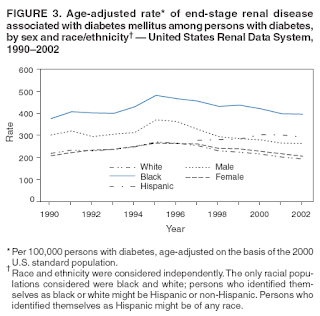Blacks more likely to progress to end stage disease, whites more likely to die before kidney failure
Blacks in the United States are more likely to require dialysis and develop end stage renal disease (ESRD) than whites, but they also live longer than whites once they reach later stages of kidney disease. A study of this phenomenon will appear in an upcoming issue of the Clinical Journal of the American Society Nephrology (CJASN).
Csaba P. Kovesdy, MD (Salem VA Medical Center), John E. Anderson, MD, Stephen F. Derose, MD, and Kamyar Kalantar-Zadeh, MD, PhD (University of California Los Angeles), investigated by comparing 298 black and 945 white male patients with moderate and advanced chronic kidney disease (CKD) who were not on dialysis and who were treated within the Veteran Health Administration (VA) System.
| The investigators found that the rates of kidney function decline were similar in blacks and whites, but blacks were less likely to die once they reached moderate to advanced kidney disease. |  |
The authors' suspect that lower death rates among blacks with moderate to advanced kidney disease is due to higher death rates among blacks in earlier stages of kidney disease. Blacks who survive earlier stages have fewer health issues (such as cardiovascular disease) than whites. This would explain why blacks had better survival rates than whites among the VA patients. "These survival discrepancies are quite different from what is seen in the general population, where black Americans typically experience higher mortality and lower life expectancy than whites," said Dr. Kovesdy. "More research is needed to explain these differences and to alleviate the racial and ethnic discrepancies in health outcomes in the US," he added. ###
Some of this material was presented at the American Society of Nephrology Renal Week 2008, Philadelphia, PA. This study is supported by grant 1R01DK078106-01 to Dr. Kovesdy and Dr. Kalantar-Zadeh. The study authors reported no financial disclosures.
The article, entitled "Outcomes Associated with Race in Males with Non-Dialysis Dependent CKD," will appear online at cjasn.asnjournals.org/ on April 15, 2009, doi 10.2215/CJN.06031108.
ASN is a not-for-profit organization of 11,000 physicians and scientists dedicated to the study of nephrology and committed to providing a forum for the promulgation of information regarding the latest research and clinical findings on kidney diseases. ASN publishes the Journal of the American Society of Nephrology (JASN), the CJASN, and the Nephrology Self-Assessment Program (NephSAP). In January 2009, the Society will launch ASN Kidney News, a newsmagazine for nephrologists, scientists, allied health professionals, and staff.
Contact: Shari Leventhal sleventhal@asn-online.org 202-416-0658 American Society of Nephrology
Image 2: CDC's Diabetes Program - Data & Trends
















No comments:
Post a Comment